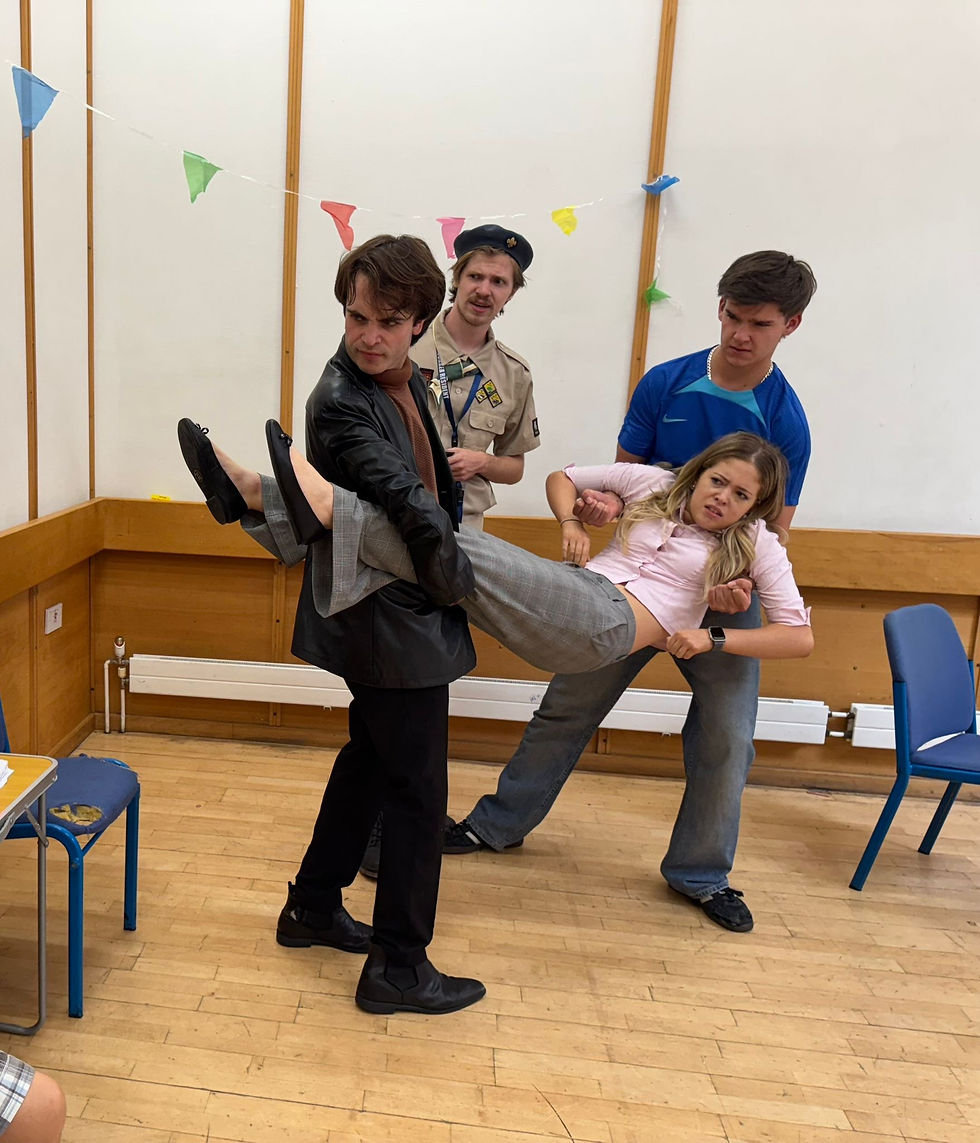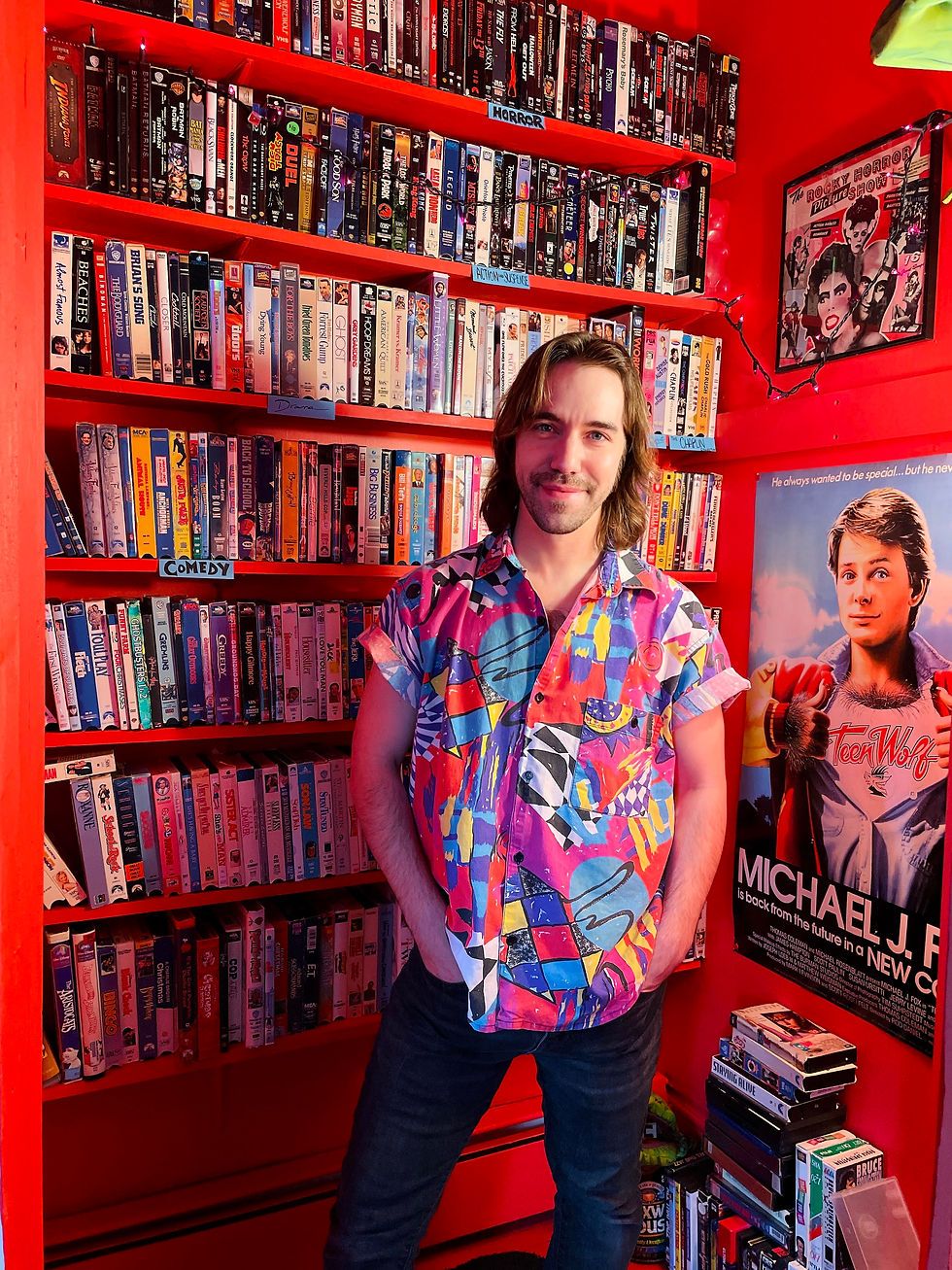Inside the Bunker with Fiascoholics
- London Theatre Doc
- Aug 3, 2025
- 4 min read
If you’re looking for full-tilt chaos with a cynical streak, Fiascoholics might be your perfect Edinburgh Fringe pick. I spoke to the team behind this nuclear bunker farce. Max Burton, Tomi Fry and Todd Bell shared their thoughts on collapsing power structures, overzealous scout leaders and the joy of throwing terrible people into a confined space.

First things first: why a nuclear bunker?
We needed higher stakes in a lot less runtime. An environment where the characters can’t easily escape each other, or even better, can’t escape at all. Enter the nuclear bunker.
And as for why now? Well, we thought we’d better bring it to the Fringe before we have a genuine apocalypse.

It sounds chaotic. How much changes night to night?
While it might feel freshly chaotic, the show won’t actually change that much. Our writing is very beat specific. We’re big on rhythm and energy, and we’ve worked hard to make sure that springs straight from the page. That said, some of our favourite moments, jokes, running gags and even whole comedy action sequences came from us just messing around in rehearsal. You can’t get much more organic than five people trying to make each other laugh.
The cast of characters is wild. How did you come up with that line-up?
We knew that for the show to work, we had to bring together a group of people who not only grind each other’s gears, but who definitely don’t deserve to be the survivors in the first place. A group of people that no one, including the audience, would ever want to be stuck in a room with.
Two billionaires that claim to be down to earth were the perfect start. Add a narrow-minded football hooligan to wind them up, a snob of an actor to wind him up, and you don’t even need a script anymore, just some popcorn. To top it off, we added a frantic, overzealous scout leader who has no real authority, but is somehow in charge of everyone’s lives. Think of the worst people you know, and there’s a good chance we’ve encapsulated a lot of their traits within these characters.
The whole thing unfolds in a very tight space. How do you build that?
One of the biggest lessons we’ve learnt is how important it is to embrace the limitations of Fringe theatre. We’re working with a confined space and a tight runtime, so every line has to matter. Every moment needs to escalate. Every beat has to drive the next one.
The play itself has a really fun dynamic. It's an ensemble piece, but every single character despises everyone else. That’s created great opportunities to explore where brief alliances, power plays or emotional connections form, and of course, where they fall apart again.
Fringe audiences are unpredictable. Does that excite or terrify you?
This summer really is the pinnacle for us. We adore the Edinburgh Fringe and want nothing more than to contribute an exciting show and get that audience laughing.
At school, we developed a bit of a reputation for our certain comedic style, but each Fringe audience is a wild, diverse crowd up for something different every night.

You mix farce with some surprising emotional weight. Has that evolved?
Absolutely. It’s something we think about constantly. Everyone knows a punchline can relieve tension, but what’s often overlooked is that tension can actually provide relief after a barrage of gags. That’s the balance we’re always wrestling with when writing. How do you pivot from absurdity to sincerity without it feeling jarring or false?
One moment that surprised us is a scene where Gareth has a breakdown over a missing register. It’s utterly ridiculous on the surface. But in the right light, it can play as something genuinely tragic. A man trying and failing to impose order in a world that’s spiralling out of control.. A man trying and failing to impose order in a world that’s spiralling out of control. We didn’t expect that resonance at first, but that’s part of the thrill. Seeing how tone evolves in performance.
Your influences range from The League of Gentlemen to The Young Ones. What draws you to that style?
These shows are what brought us together as a trio. A huge goal of ours is to revive a certain strain of absurd, unapologetically silly comedy that we feel has been pushed aside in favour of realism in mainstream work. When the world itself feels increasingly surreal, we think comedy should reflect that. Characters should be just as ridiculous, chaotic and immoral as the world they’re in.
How would you describe your comic style?
The style is very beat-driven and farcical - there’s definitely a bit of Mischief Theatre in its bones - but the subject matter is dark. Think League of Gentlemen-level bleak. The comedy is sharp, cynical, and unashamedly nihilistic. That said, we really hope it’s clear to the audience that these characters are extreme parodies. You’re meant to laugh at them, not with them. They’re all unsympathetic, narcissistic idiots. It’s basically Big Brother on acid.
What moment always makes you break in rehearsal?
There is one moment in particular that gets us every time. One of the characters, Henry, the pretentious actor, has a peculiar habit of speaking stage directions out loud, whether it’s "Henry struts forward" or "Henry winks at Phil". In a desperate moment when he is about to be thrown out of the bunker he exclaims, "Henry pisses his pants" and everyone drops him in disgust. The delivery of that line paired with everybody’s reactions usually breaks one of us.

And finally. If one more person showed up at the bunker door, who would it be?
Easy. Dua Lipa. And no, we’re not just really big fans of Future Nostalgia, there is a reason. But for that, you’ll have to come along. We can’t wait to see you there.




Comments